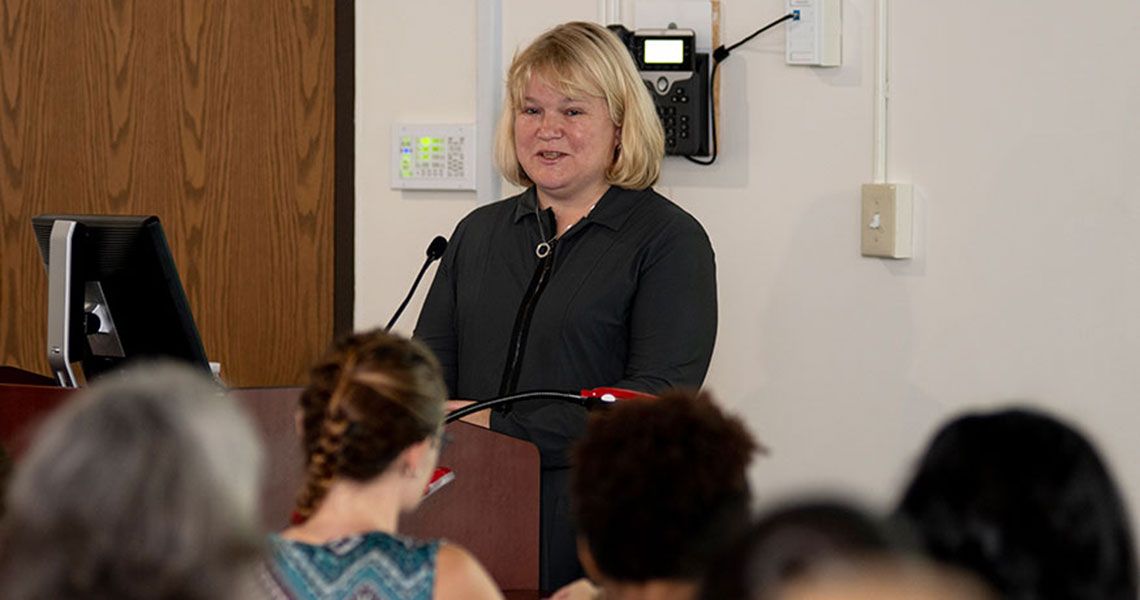The George Washington University (GW) School of Medicine and Health Sciences’ (SMHS) 10th Annual Allan B. Weingold Lecture addressed the important common topic of thyroid disorders during pregnancy. Coincidentally, the lecture was held on the same day as the 2018 Maternal and Infant Health Summit hosted by Washington, D.C. Mayor Muriel Bowser.
“If Dr. Weingold were here today, I know he would want to attend the women’s health summit with us as an advocate for the women of Washington, D.C.,” said Nancy Gaba, MD ’93, RESD ’97, chair of the Department of Obstetrics and Gynecology and Oscar I. and Mildred S. Dodek and Joan B. and Oscar I. Dodek Jr. Professor of Obstetrics and Gynecology at SMHS. “He was known for being an advocate for women’s health.”
Kristiina E.L. Parviainen-Yang, MD, RESD ’99, assistant professor of obstetrics, gynecology, and reproductive sciences at the University of Pittsburgh School of Medicine, addressed the audience as the keynote of the 10th anniversary event. She also serves as associate fellowship director and residency program director at Magee-Womens Hospital in the University of Pittsburgh Medical Center (UPMC) system.
During her residency at GW, Parviainen-Yang distinguished herself as a hardworking resident receiving every teaching award offered by the Department of Obstetrics and Gynecology, including the Allan B. Weingold Award. Following residency training, she worked as a faculty member at GW before pursuing a fellowship at UPMC Magee-Womens Hospital, where she later joined the faculty.
Parviainen-Yang’s lecture focused on the management of thyroid disorders during pregnancy and the controversy surrounding diagnosis and management of subclinical hypothyroidism with the intention of improving intellectual function of children.
“This is an area with quite a bit of variability in practice and quite a bit of debate in terms of what the right thing to do for our patients is,” she explained. “There’s a difference between what endocrinologists view as part of their domain and what obstetricians view as part of their decision-making.”
The relevance of thyroid disorders in pregnancy, said Parviainen-Yang, is anything that happens to the mother, can potentially impact the fetus, especially in early pregnancy.
The interest in the fetal thyroid function, stems from diagnoses of what used to be referred to as “cretinism,” which is now recognized as congenital hypothyroidism. Because the disorder can cause intellectual impairment, all 50 states and the District of Columbia now screen newborns for congenital hypothyroidism.
Concerns about cognitive impairment have also prompted a call to screen all pregnant women for hypothyroidism. However, screening asymptomatic women is controversial. Initial studies into the disorder and its impact on IQ scores among children indicated that systematic screening in early pregnancy may be worthwhile. Parviainen-Yang expertly explained these studies and outlined their potential flaws.
A more recent investigation she presented, conducted by a maternal-fetal medicine unit supported by the Eunice Kennedy Shriver National Institute of Child Health and Human Development concluded that treatment of hypothyroidism did not result in a clinically significant improvement incognitive outcomes for children.
In response to the data, the American Thyroid Association and the American College of Obstetricians and Gynecologists concluded that universal screening for thyroid disease is not recommended due to lack of evidence that it improves neurocognitive function in offspring.
“At this point the case is closed,” said Parviainen-Yang. “If what you’re looking to do is improve neurocognitive function, it is not a justification to treat subclinical hypothyroidism.”



